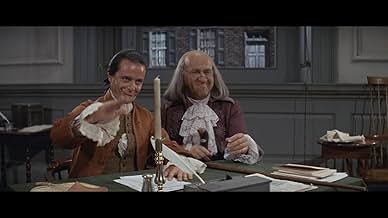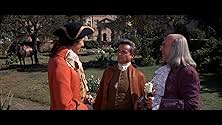Una rivisitazione musicale della lotta politica della rivoluzione americana nel Congresso continentale per dichiarare l'indipendenza.Una rivisitazione musicale della lotta politica della rivoluzione americana nel Congresso continentale per dichiarare l'indipendenza.Una rivisitazione musicale della lotta politica della rivoluzione americana nel Congresso continentale per dichiarare l'indipendenza.
- Regia
- Sceneggiatura
- Star
- Candidato a 1 Oscar
- 1 vittoria e 2 candidature totali
Recensioni in evidenza
William Daniels as John Adams stole the show. He was the best actor in a very strong cast and I was captivated from the very first scene. He has such a cool voice. (But no matter what he's done in his career, he's always be Mr. Feeny to me!) I've always admired the real John Adams to boot so he made an engaging protagonist. Howard de Silva as Benjamin Franklin was another definite highlight acting wise.
The film's standout feature is its witty and engaging screenplay, adapted from the Broadway musical by Peter Stone. The dialogue is sharp and filled with clever wordplay, capturing the essence of the passionate debates and political maneuvering that characterized the birth of the United States. The songs, composed by Sherman Edwards, are both entertaining and historically informative, blending seamlessly into the narrative and providing insight into the characters' motivations.
William Daniels delivers a standout performance as John Adams, capturing the fiery determination and idealism of the future second President of the United States. His interactions with Howard Da Silva's Benjamin Franklin and Ken Howard's Thomas Jefferson are particularly memorable, showcasing the camaraderie and occasional tensions among these historical figures.
Despite its predominantly indoor setting and dialogue-heavy nature, the film manages to maintain visual interest through effective staging and cinematography. The period costumes and sets are meticulously designed, transporting viewers back to the turbulent days of the American Revolution.
"1776" is not merely a historical drama but also a reflection on the enduring principles of democracy and independence. It successfully blends entertainment with education, offering viewers a compelling look at a pivotal moment in American history while celebrating the human spirit and determination that shaped the nation.
In conclusion, "1776" is a must-see for history enthusiasts and fans of musical theater alike. Its engaging performances, witty script, and memorable songs make it a timeless portrayal of the events leading up to the birth of a nation.
The Broadway version of "1776" became a sensation with audiences and went on to win the Tony Award for Best Musical of 1969.
During this era of film-making, the musical was still considered to be a draw for audiences, so it was natural to take this show and bring it to the big screen. And best of all, John Warner brought the bulk of the cast from the show to the film. William Daniels IS John Adams to a lot of people, and his portrayal of the feisty proponent for independence is one of the great performances of any "real life" character. Daniels is equaled by his fellow Congressional cohorts, Ken Howard as the author of the document, Thomas Jefferson, and the amazing Howard Da Silva as the good doctor, Benjamin Franklin.
To me, the most remarkable element is the facts of the story are pretty much accurate, the timing of the events, measured with a wall calendar, keeps the tension going as we count down to that particular date... July 1st, 2nd, 3rd...
But it's more than just the story of the founding of the country, it's a love story, or really two, with the Jeffersons Martha, played by Blythe Danner and the Adams pair, with the incredible Virginia Vestoff as John's Abigail who interacts with her husband only in his mind.
For a musical, it is something of a "warts and all" examination of the process, as the south refuses to sign a declaration that freed their slaves, as Jefferson had intended in the original draft. John Cullum brilliantly voices this discussion as the genteel South Carolinian, Edward Rutledge, in the hypnotic and haunting "Molasses to Rum." In fact, every song in the score is well thought out, clever, truthful and very entertaining!
Maybe this isn't *exactly* how the USA began, but, at least once a year, let's say it is.
None of the score, excellent though it is by Sherman Edwards, was calculated to make the hit parade. The songs don't really stand alone, but they are part and parcel of the telling of the tale of the American Declaration of Independence. But what 1776 does is tell just how difficult it was to achieve a consensus for American independence even after we had been fighting the might of the British armies in the northern colonies for over a year.
Two of the men at the Second Continental Congress John Adams (William Daniels) and Thomas Jefferson (Ken Howard) became American presidents. Others there are more or less widely known, depending how deeply one has read into American history or paid good attention in class during school. I think most people would have more than a nodding acquaintance with Benjamin Franklin (Howard DaSilva). All three of these players came over from the original Broadway cast as did most of the film's players.
All of these people as Franklin said are the cream of their colony's society even if that society was built on human slavery. That the South's peculiar institution as they liked to phrase it came from the mother country is sometimes conveniently forgotten by critics of the USA. But slavery's existence was the biggest stumbling block towards building that consensus as 1776 graphically shows.
The founding fathers as we Americans call these guys are shown to be flesh and blood. Franklin who was the wisest one in the bunch deprecated in the film and in real life the demigod status that would attach to them. One founding father however does get a raw deal from 1776. James Wilson was not in the indecisive ninny who only craved obscurity. Emory Bass who also came over from Broadway played him that way because he was written that way. In fact Wilson who should have had the Scottish burr in his speech that was given to Ray Middleton's Thomas McKean, was a man of great distinction and learning. If he didn't shine at the 2nd Continental Congress, he more than made up for it at the Constitutional Convention. A lot of what is in the Constitution is there because of him. He was also one of the original members of the Supreme Court that George Washington appointed. Not at all like the fellow you see in 1776.
The ladies aren't ignored, Martha Wayles Jefferson appears in the flesh to give Tom Jefferson some relief from some tension he was having and is played by Blythe Danner. Virginia Vestoff plays Abigail Adams who only appears in William Daniel's imagination. It's fascinating to see Adams yearning for the wife, but still tending to business. When he became our second president, Abigail stayed in Braintree, Massachusetts which was their home and John spent as much time as he could with her and not really staying on top of things in Philadelphia and later in the new capital of Washington, DC. That's another subject for another film.
In fact watching these gentlemen reach the consensus for American independence is watching them reach said consensus, but also knowing how they all became some really bitter enemies later on after the nation's freedom was secured. I hope some who read this review and see 1776 will take the time and trouble to see just what happened with the rest of these people.
And if the film stirs your curiosity about how America was founded, than 1776 will be well worth watching.
A side comment: the film isn't just made for Americans. I recommended it to some of my friends in India, and they loved it. You don't even need to know anything about American history or the Declaration of Independence to "get" the movie -- it stands on its own!
Another amazing thing about this movie is its drama. You know from the beginning what's going to happen, but you're still caught up in the drama of the film.
Lo sapevi?
- QuizIn an interview in TV Guide in the 1970's, Ken Howard related that he was rehearsing some of his lines from the play aloud while traveling on an airplane. The inflammatory revolutionary rhetoric caused the plane's crew to summon the police and he was questioned by the authorities when the plane landed.
- BlooperSouth Carolina was not resistant to the notion of independence, far from it. In fact, South Carolina had rewritten its constitution in 1774, removing all references to Royal Authority.
It is stated quite clearly in the film that South Carolina would welcome independence, not just from England but from the other states as well.
- Citazioni
John Adams: I have come to the conclusion that one useless man is called a disgrace; that two are called a law firm, and that three or more become a Congress! And by God, I have had this Congress! For ten years, King George and his Parliament have gulled, cullied, and diddled these colonies with their illegal taxes! Stamp Acts, Townshend Acts, Sugar Acts, Tea Acts! And when we dared stand up like men, they have stopped our trade, seized our ships, blockaded our ports, burned our towns, and spilled our BLOOD! And still, this Congress refuses to grant ANY of my proposals on independence, even so much as the courtesty of open debate! Good God, what in hell are you waiting for?
- Curiosità sui creditiThe theatrical version has no credits at the beginning other than "Columbia Pictures presents" and the film's title. The Director's Cut and the extended laserdisc edition includes a main title sequence at the opening.
- Versioni alternativeThe studio cut the film heavily prior to its release. Released theatrically at 141 minutes; laserdisc reissue is 180 minutes and features deleted footage, alternate takes for certain scenes, and an additional musical number titled "Cool Considerate Men." This version also includes an overture and intermission. According to the laserdisc jacket, the original film elements of the extended version were destroyed; thus the deleted scenes were taken from whatever Columbia could find, mostly old, misused prints (which leads to a decrease in picture and sound quality whenever the film transitions from the theatrical version to the deleted footage). One deleted scene was taken from a black-and-white print and was presented as such.
- ConnessioniFeatured in Playing Columbine (2008)
I più visti
Dettagli
- Data di uscita
- Paese di origine
- Sito ufficiale
- Lingua
- Celebre anche come
- 1776 - Rebellion und Liebe
- Luoghi delle riprese
- Columbia/Warner Bros. Ranch - 411 North Hollywood Way, Burbank, California, Stati Uniti(Benjamin Franklin sitting for painting)
- Azienda produttrice
- Vedi altri crediti dell’azienda su IMDbPro
Botteghino
- Budget
- 4.000.000 USD (previsto)
- Tempo di esecuzione
- 2h 21min(141 min)
- Mix di suoni
- Proporzioni
- 2.35 : 1



















